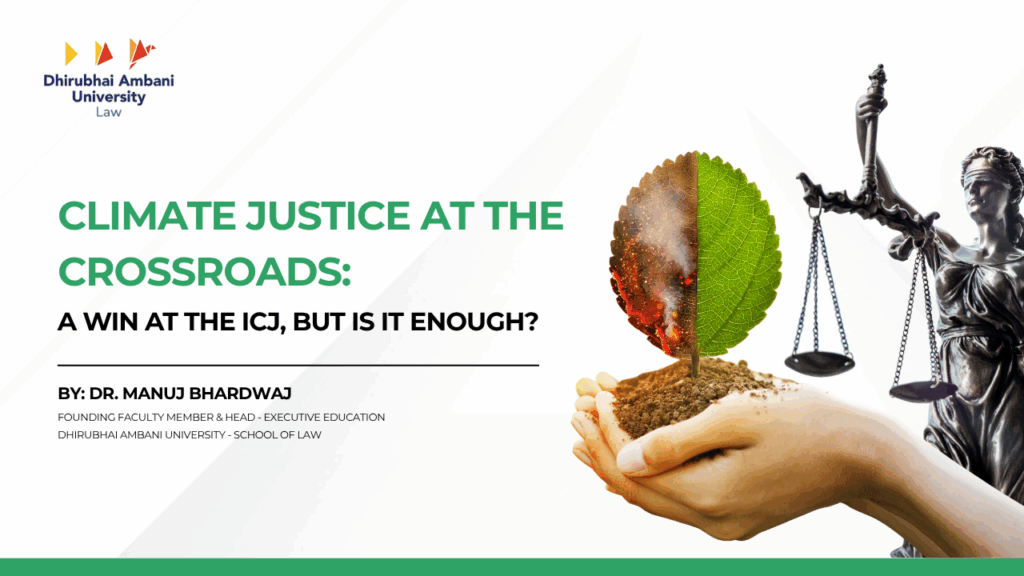
By: Prof. (Dr.) Manuj Bhardwaj
Founding Faculty, Dhirubhai Ambani University – School of Law
Vertical Head - ESG, Carbon Markets & Sustainability, Dhirubhai Ambani University – School of Law
On July 23, 2025, the International Court of Justice (ICJ) delivered a landmark advisory opinion that many are calling a historic leap for climate justice. The Court, responding to a 2023 UN General Assembly request, declared that climate inaction is no longer merely a political failure it now constitutes a breach of international legal obligations.
For climate-vulnerable nations, especially small island states, this moment is profound. The ICJ affirmed that climate change must be treated as an “existential threat,” that states are obligated to adopt targets of the “highest possible ambition,” and that they must work collectively to keep global warming below the 1.5°C threshold. Drawing from human rights law, international environmental law, and the UN Convention on the Law of the Sea, the Court clarified that states can no longer ignore their responsibilities to future generations.
Yet for all its moral force, the ruling remains non-binding, a powerful opinion, yes, but not a legal verdict that mandates immediate compliance. This is where the celebration must give way to sober reflection.
From a legal standpoint, international environmental law has long struggled with soft enforcement mechanisms. Despite decades of treaty-making, from the 1992 Rio Earth Summit to the Paris Agreement, implementation often hinges on voluntary national commitments and diplomatic goodwill. There are few, if any, tangible penalties for noncompliance. In other words, the ICJ’s opinion marks a major symbolic shift, but the tools to enforce it remain largely aspirational.
This is precisely where the concept of climate justice comes into sharp focus.
In my own research on global climate equity and justice, I’ve argued that unless the world adopts a justice-centered framework, particularly the Common But Differentiated Responsibilities and Respective Capabilities (CBDR-RC) principle first enshrined in the UNFCCC, we will continue to fall short. Climate justice is not just about science or economics; it is fundamentally about fairness: those who contributed most to the crisis must lead the response, and those most vulnerable must be meaningfully supported.
The ICJ’s opinion does reference this principle, implicitly strengthening the case for differentiated responsibilities. But without hard legal commitments from the world’s biggest polluters, including both developed nations and emerging economies still reliant on fossil fuels, the path forward remains uncertain. The unfortunate truth is that those most affected by climate change are still the least responsible and the least empowered to change course.
As I wrote in my master’s thesis, this dynamic creates a triple injustice:
- The poorest are hit first and hardest,
- They have the fewest resources to adapt, and
- The polluters often go unpunished.
The ICJ has taken a vital step in articulating that this situation is not only morally unjust but legally untenable. However, unless this moral clarity is followed by binding commitments, financial transfers, and strong domestic legal reforms, its transformative potential risks being lost in diplomatic limbo.
To echo the words of Dr. Martin Luther King Jr.: “Injustice anywhere is a threat to justice everywhere.” Climate justice must be about more than visionary declarations. It must be about structural change, proportionate responsibility, and enforceable action. The ICJ has drawn the map. Now, it’s up to nations, especially the most powerful and polluting to walk the path.
